高考专题复习情态动词
高考语法复习之情态动词
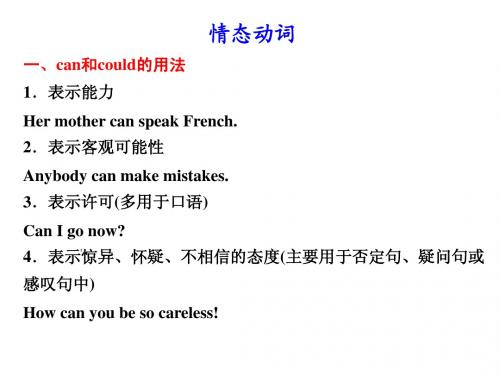
五、will和would的用法 1.will (1)表示请求、建议,常用于第二人称。 Will you please go with me? (2)表示意愿、决定、允许。 I will never do that again. (3)表示习惯性动作或某种倾向,“总是,惯于”,通常用 于第三人称。 Fish will die out of water.
解析
句意为:要耐心。你不能期望世界会这么快地改变。 not可能不;
can’t不可能,不能;needn’t没有必要;may will not将不会,不会。根据句意知选A项。
5.—I haven’t got the reference book yet,but I’ll have a test on the subject next month. —Don’t worry.You A.could
—I’m afraid n我可以把这本书带出去吗?——恐怕不
行。may可用来表示请求、许可。
4.Just be patient.You soon. A.can’t C.may not
A
expect the world to change so (2010· 全国Ⅰ,29) B.needn’t D.will not
感悟高考
1.You
D
buy a gift,but you can if you want to. (2010· 湖南,23) B.mustn’t D.don’t have to
A.must C.have to
解析
句意为:你不必买礼物,但是如果你想买的话也可以
买。mustn’t禁止,不可以;don’t have to不必。根据句意, D项正确。
Ⅰ.用适当的情态动词填空 1. Looking people in the eye can sometimes make them nervous and embarrassed. 2.—Oh my god!You shouldn’t wear slippers to attend the conference. —I’m sorry.I forgot there is a conference. 3.—Hello,Peter.Would you please go shopping with me after school? —Sorry.Our school is a boarding school.In school days nobody shall go out of school without the head teacher’s permission.
高考专题复习——情态动词
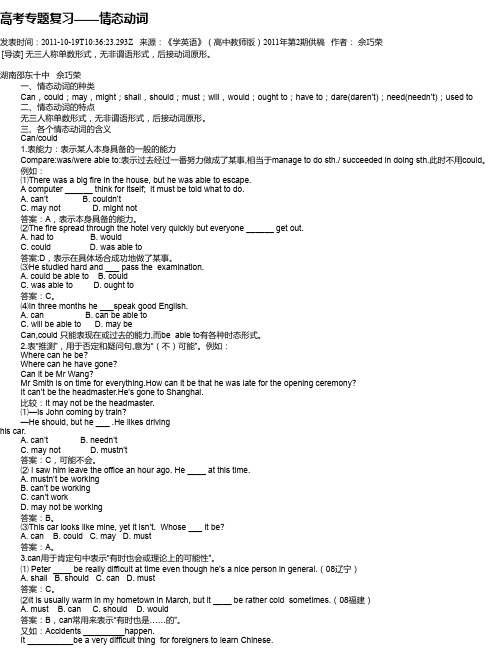
高考专题复习——情态动词发表时间:2011-10-19T10:36:23.293Z 来源:《学英语》(高中教师版)2011年第2期供稿作者:佘巧荣[导读] 无三人称单数形式,无非谓语形式,后接动词原形。
湖南邵东十中佘巧荣一、情态动词的种类Can,could;may,might;shall,should;must;will,would;ought to;have to;dare(daren’t);need(needn’t);used to二、情态动词的特点无三人称单数形式,无非谓语形式,后接动词原形。
三、各个情态动词的含义Can/could1.表能力:表示某人本身具备的一般的能力Compare:was/were able to:表示过去经过一番努力做成了某事,相当于manage to do sth./ succeeded in doing sth.此时不用could。
例如:⑴There was a big fire in the house, but he was able to escape.A computer ______ think for itself; it must be told what to do.A. can’tB. couldn’tC. may notD. might not答案:A,表示本身具备的能力。
⑵The fire spread through the hotel very quickly but everyone ______ get out.A. had toB. wouldC. couldD. was able to答案:D,表示在具体场合成功地做了某事。
⑶He studied hard and ___ pass the examination.A. could be able toB. couldC. was able toD. ought to答案:C。
⑷In three months he ___speak good English.A. canB. can be able toC. will be able toD. may beCan,could 只能表现在或过去的能力,而be able to有各种时态形式。
高考情态动词归纳
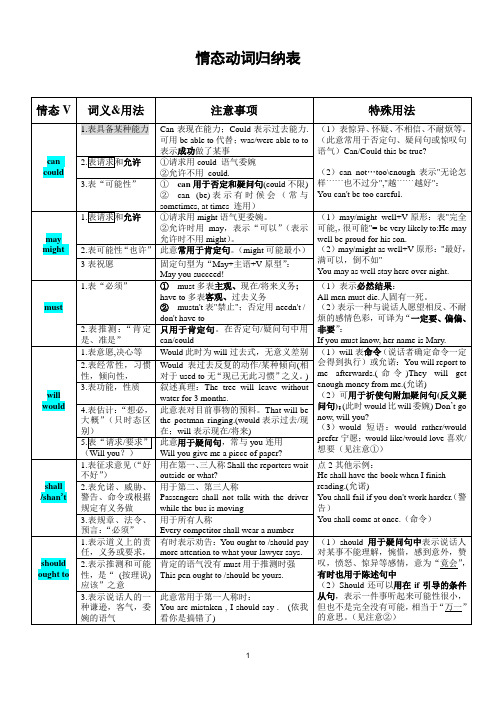
情态动词归纳表情态V词义&用法注意事项特殊用法can could 1.表具备某种能力Can表现在能力;Could表示过去能力.可用be able to代替;was/were able to to表示成功做了某事(1)表惊异、怀疑、不相信、不耐烦等。
(此意常用于否定句、疑问句或惊叹句语气)Can/Could this be true?(2)can not…too\enough表示"无论怎样``````也不过分","越``````越好":You can't be too careful.2.表请求和允许①请求用could 语气委婉②允许不用could.3.表“可能性”①can用于否定和疑问句(could不限)②can (be)表示有时候会(常与sometimes, at times 连用)may might 1.表请求和允许①请求用might语气更委婉。
②允许时用may,表示“可以”(表示允许时不用might)。
(1)may/might well+V原形:表"完全可能,,很可能"= be very likely to:He maywell be proud for his son.(2)may/might as well+V原形:"最好,满可以,倒不如"You may as well stay here over night.2.表可能性“也许”此意常用于肯定句。
(might可能最小)3表祝愿固定句型为“May+主语+V原型”:May you succeed!must 1.表“必须”①must多表主观、现在/将来义务;have to多表客观、过去义务②mustn't表"禁止";否定用needn't /don't have to(1)表示必然结果:All men must die.人固有一死。
高考英语情态动词专题训练答案及解析
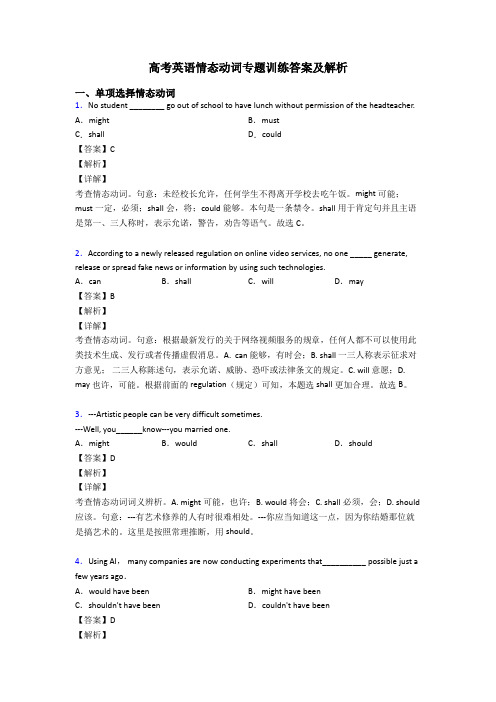
高考英语情态动词专题训练答案及解析一、单项选择情态动词1.No student ________ go out of school to have lunch without permission of the headteacher. A.might B.mustC.shall D.could【答案】C【解析】【详解】考查情态动词。
句意:未经校长允许,任何学生不得离开学校去吃午饭。
might可能;must一定,必须;shall会,将;could能够。
本句是一条禁令。
shall用于肯定句并且主语是第一、三人称时,表示允诺,警告,劝告等语气。
故选C。
2.According to a newly released regulation on online video services, no one _____ generate, release or spread fake news or information by using such technologies.A.can B.shall C.will D.may【答案】B【解析】【详解】考查情态动词。
句意:根据最新发行的关于网络视频服务的规章,任何人都不可以使用此类技术生成、发行或者传播虚假消息。
A. can 能够,有时会;B. shall 一三人称表示征求对方意见;二三人称陈述句,表示允诺、威胁、恐吓或法律条文的规定。
C. will 意愿;D. may 也许,可能。
根据前面的regulation(规定)可知,本题选shall更加合理。
故选B。
3.---Artistic people can be very difficult sometimes.---Well, you______know---you married one.A.might B.would C.shall D.should【答案】D【解析】【详解】考查情态动词词义辨析。
A. might可能,也许;B. would将会;C. shall必须,会;D. should 应该。
情态动词高中知识点高三

情态动词高中知识点高三情态动词是一类具有特殊意义和用法的动词,它们在句子中一般与实义动词连用,表示说话人的推测、命令、请求、建议等情态。
在高中英语学习中,掌握情态动词的正确用法至关重要。
本文将介绍情态动词的相关知识点,帮助高三学生更好地运用这一语法现象。
一、情态动词的定义情态动词,又称情态助动词,是用来表示说话人对某种动作或状态的态度、推测、可能性、能力、意愿、义务等情态的一类特殊动词。
常见的情态动词包括can、could、may、might、must、shall、should、will、would等。
二、情态动词的用法1. 表示能力情态动词can表示某人具有能力或可能做某事,could用于过去说法。
例如:- She can speak three languages fluently.(她能说流利的三种语言)- He could lift the heavy boxes when he was younger.(他年轻时能搬起这些沉重的箱子)2. 表示推测和可能性情态动词may、might、could用于表示推测和可能性。
may用于表示较为肯定的推测,might和could表示推测的可能性较小。
例如:- The weather is cloudy, it may rain later.(天气多云,可能会下雨)- He might be late for the meeting.(他可能会迟到会议)3. 表示义务和建议情态动词must表示说话人对某种行为具有强烈的责任感或坚决要求,should表示建议。
例如:- We must obey the laws of the country.(我们必须遵守国家的法律)- You should apologize to your friend for your mistake.(你应该为你的错误向朋友道歉)4. 表示许可和请求情态动词can、may、could用于表示允许和请求。
语法2情态动词及动词的时态语态

16) Jack _______ yet, otherwise he would have telephoned me. (97 上海卷) A. mustn’t have arrived B. shouldn’t have arrived
C. can’t have arrived D. need not have arrived 答案 C 17) “ Could I call you by your first name?” “ Yes, you _______.” A. will 答案 C B. could (98 上海卷) C. may D. might
4) The fire spread through the hotel very quickly, but everyone _______ get out. (NMET97) A. had to 答案 B. would C. could D. was able to
D 5) “When can I come for the photos? I need them tomorrow afternoon.” “They _______ be ready by 12:00.” (NMET 98) A. can 答案 B B. should C. might D. need
18) There was a lot of fun at yesterday’s party. You ______ come, but why didn’t you? (99 上海卷) A. must have C. need have 答案 D B. should D. ought to have
4、现在进行时: 1)、 have, be, hear, see, like, remember, find 及 sound等一般不用进行时。 2)、 go, come, start, leave及arrive可用进行时表 示将来。 3)、be always doing表示正在干…,常有责备或表扬 之意。 4)、be asking for trouble习惯都用进行时。
高考英语必备语法:情态动词
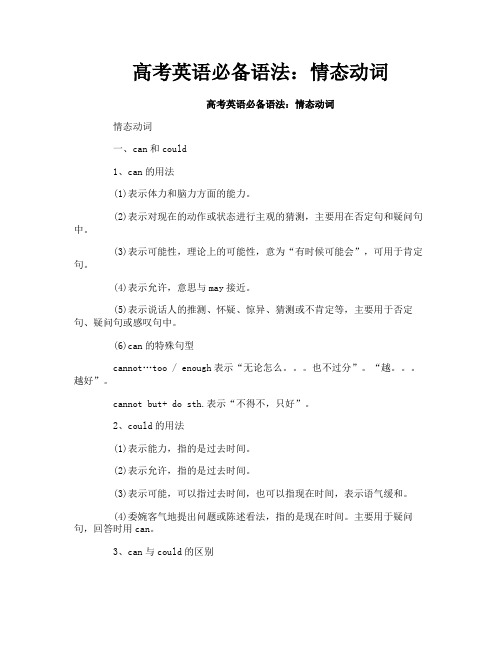
高考英语必备语法:情态动词高考英语必备语法:情态动词情态动词一、can和could1、can的用法(1)表示体力和脑力方面的能力。
(2)表示对现在的动作或状态进行主观的猜测,主要用在否定句和疑问句中。
(3)表示可能性,理论上的可能性,意为“有时候可能会”,可用于肯定句。
(4)表示允许,意思与may接近。
(5)表示说话人的推测、怀疑、惊异、猜测或不肯定等,主要用于否定句、疑问句或感叹句中。
(6)can的特殊句型cannot…too / enou gh表示“无论怎么。
也不过分”。
“越。
越好”。
cannot but+ do sth.表示“不得不,只好”。
2、could的用法(1)表示能力,指的是过去时间。
(2)表示允许,指的是过去时间。
(3)表示可能,可以指过去时间,也可以指现在时间,表示语气缓和。
(4)委婉客气地提出问题或陈述看法,指的是现在时间。
主要用于疑问句,回答时用can。
3、can与could的区别can表推测时只用于否定句和疑问句(could无此限制)。
couldn’t的可能性比can’t小。
4、can与be able to的区别(1)现在时:无区别,但后者不常用。
(2)完成时;can没有完成时,此时要用have(has,had)been able to。
(3)将来时:can没有将来时,要用will be able to。
(4)过去时:could表示一般能力,was/were able to 表示在具体场合通过努力成功做成某事的能力。
二、may 和might1、may的用法(1)表示询问或说明一件事可不可以做。
(2)表示一件事或许会发生或某种情况可能会存在,通常用在肯定句和否定句中。
注意:表示可能性时,can’t语气强,表示“不可能”,may not语气弱,表示“可能不”。
2、might的用法(1)表示询问或允许,指的是过去时间。
(2)表示可能发生的事,可以指过去时间,也可以指现在时间,语气更加不肯定,可能性比may小一些。
高考中对情态动词的考查

高考中对情态动词的考查情态动词是高考考查的重点语法项目之一,2005年全国17套高考试题对此都有考查。
下面就近几年来高考试题中出现的情态动词的考点实行归纳分析,以便同学们复习掌握。
一、情态动词表推测1. 肯定的推测一般用must, should, may(might)或could(不用can),其中,must的语气最强,译为“肯定”、“准是”、“想必是”;should的语气次之,译为“很可能”、“应该”,指按常理推测;may(might),could的语气最弱,译为“也许”、“可能”。
①Helen _______ go on the trip with us but she isn’t quite sure yet. (2005年安徽卷)A. shallB. mustC. mayD. can②—I’ve taken someone else’s green sweater by mistake.—It ___ Harry’s. He always wears green. (2005年广东卷)A. has to beB. will beC. mustn’t beD. could be③I have lost one of my gloves. I _______ it somewhere.(2005年北京春季卷)A. must dropB. must have droppedC. must be droppingD. must have been dropped④If I ____ plan to do anything I wanted to ,I’d like to go to Tibet and travel through as much of it as possible. (2005年湖北卷)A. wouldB. couldC. had toD. ought toKey:C D B B2. 否认推测分为两种情况:1)语气不很肯定时,常用may not, might not或could not,译为“可能不”、“也许不”。
- 1、下载文档前请自行甄别文档内容的完整性,平台不提供额外的编辑、内容补充、找答案等附加服务。
- 2、"仅部分预览"的文档,不可在线预览部分如存在完整性等问题,可反馈申请退款(可完整预览的文档不适用该条件!)。
- 3、如文档侵犯您的权益,请联系客服反馈,我们会尽快为您处理(人工客服工作时间:9:00-18:30)。
一、考点聚焦1、 情态动词的基本用法(1)can 、be ableto 和could①can 和be able to 都表示能力,意思上没多大区别。
但can 只有现在和过去时,而be able to 则有更多的形式。
但当成功地完成某一具体动作时,通常不用could 而用was/were able to 来表示。
这时was/were able to 相当于managed to ,表示经过一番努力,终于能够完成某事。
如:Can you use chopsticksThe wounded man still was able to get to the village and was saved in the end.②can 和couldcan 和could 都可以表示能力、技能、许可、建议或请求和可能性。
但比较委婉客气地提出问题或陈述看法,一般用could ,回答时则用can 。
如:Could you help me carry the bag Can I help you (2)may/might①may/might 表示可能,但may 比might 可能性大。
如:-Why isn’t he in class He may be sick.(生病的可能性较大) —He might be sick.(生病的可能性较小) ②may/might 表示“允许”,may 用于现在时或将来时,might 常用在间接引语中表过去时,但might 也可用于现在时间,表示比较委婉的语气,回答用may 。
如:He says we may leave. He said we might leave.③may / might 表示建议或请求,但might 比may 更客气,意思更肯定而无过去时态的含义。
Yes, you can / may. —May / Might I use your bike —No, you mustn’t (3)must①must 表示必须,应该,没有时态变化。
如: You must do everything as I do. ②must 表示肯定的推测。
如:The light is still on, so he must be at home. ③mustn’t 表示禁止做某事。
如: You mustn’t smoke in the office. (4)have to have to 表示“必须、不得不”,是由于某种外界(客观)原因而“必须”,“不得不”做某事,也可表示经常的或习惯性的事“必须”做。
have to 的否定形式表示不必。
have to 可用于多种时态中。
如:You will have to clean your own boots when you join the army. I have to be at my office every evening. (5)should / ought to学 科:英语复习内容:语法——代词情态动词 预计用时:10学时①should和ought to表示应当、应该,前者比后者语气轻。
如:You should / ought to work hard.②should / ought to work hard.Since she is not here, whe should / ought to be in the classroom.③should / ought to的否定形式表示禁止之意。
如:Children shouldn’t smoke.④should可表示陈述意见,推出建议或请求;而ought to可以表示劝告之意。
如:You ought to respect your parents.He suggested that they should leave at once.(6)will / would①will 用于各种人称表示“意志”、“意愿”或“决心”等,否定式won’t + 动词。
如:I will tell you all about it.Tom won’t do such a thing.②will用于疑问句中,常用在第二称时表示说话人向对方提出“请求”或“询问”如:Will you please tell her the news when you see her③will 表示习惯性的动作,有“总是”、“惯于”的含义。
如:Fish will die out of water.④would 表示客气的请求、建议或意愿。
如:Would you please be quietWould you like coffee⑤would 表示过去反复发生的动作。
如:When I passed my school I would see my teachers who taught me 5 years ago.(7)needneed 作“必要”讲,既可作情态动词,也可作实义动词。
作实义动词时后面的动词不定式要带to,其变化与一般动词相同。
如:I need to think it over.—Need you go now —Yes, I must./No, I needn’t(8)daredare表示“敢”的意思。
作为情态动词时,主要用在疑问句和否定句中。
dare若作实义动词,后面可带to的不定式,此时to也可以省略。
dare与need的用法相似。
如:How dare you say thatShe doesn’t date(to)ask her father.(9)used toused to表示过去常常发生的动作或存在的习惯,但现在已不复存在了。
如:He used to smoke.(10)shall①shall作为情态动词用于第二、三人称,表示说话人的意愿,有“命令”、“警告、威胁、强制”和“允许”等意思。
如:We shall do as our teacher says.You shall have the book as soon as I finish it.②在疑问句中,shall用于征求对方的意见或请求指示,常用于第一、第三人称。
如:Where shall he wait for usShall we go out for a walk2、情态动词表示推测或判断的用法下表即是表示推测的情态动词使用的场合:例如:It must have rained last night.She may not be at home. = It is possible that she is not at home.She can’t be at home. = It is impossible that she is at home.They should be there right now.3、情态动词在虚拟语气中的用法情态动词用于虚拟语气中表示责备的感情色彩,用法如下:(1)should have done表示“本来应该做某事而实际上未做”,而shouldn’t have done则表示“本不应该做某事而实际上做了”。
如:You should have told me about it earlier.You shouldn’t have said such words to your parents.(2)ought to have done也表示“本应该……”而ought not to have done则意为“本不应该……”。
如:You ought to have told me about it earlier.You ought not to have said such words to your parents.(3)needn’t have done表示“本无必要做某事而实际上做了”。
如:You needn’t have walked so quickly since time was enough.(4)could have done表示“本来有可能……而事实上未做到”。
如:I could have come on time, but my car broke on the way.二、精典名题导解选择填空1. I was really anxious about you. You________home without a word.(NMET 2001)’t have ’t have left’t have left ’t have解析:答案为B。
本题考查的是情态动词在虚拟语气中的用法。
题目给出的条件是“我确实非常担心你”,因此后面可知应是责备you不应该没说一句话就离开了。
2.—Are you coming to Jeff’s party—I’m not sure. I__________ go to the concert instead.(NMET 2000)解析:答案为D。
本题考查情态动词的基本用法。
由题目中“I’m not sure”,表明我可能去Jeff’s party,也可能去音乐会,故用might。
3. —Will you stay for lunch—Sorry, ____________. My brother is coming to see me.(NMET 99)mustn’t can’t needn’t won’t解析:答案为B。
本题考查表示请求的英语口语,用will来向第二人称提问的疑问结构,是表示一种请求和意愿,是用疑问的形式来表达较为婉转的祈使语气,意思是“请你……,好吗”,对于这种问句的肯定回答是:Suree! Gertainly! Yes, of course. I’d be glad to 等;否定回答通常是:I’m sorry, I can’t. No, I’m afraid I can’t. I’m sorry, but … I’d like to, but …等。
注意情态动词表客气的用法及其在一般疑问句中的问与答。
4.—Isn’t that Ann’s husband over there—No, it be him I’m sure he doesn’t wear glasses.A. can’tB. must notC. won’tD. may not解析:答案为A。
本题考查情态动词表推测。
问:那边的难道不是Ann的丈夫吗?答:不是。
不可能是他,我确信他不戴眼镜。
be tired-you’ve only been working for an hour.A. must notB. won’tC. can’tD. may not解析:答案为C。
